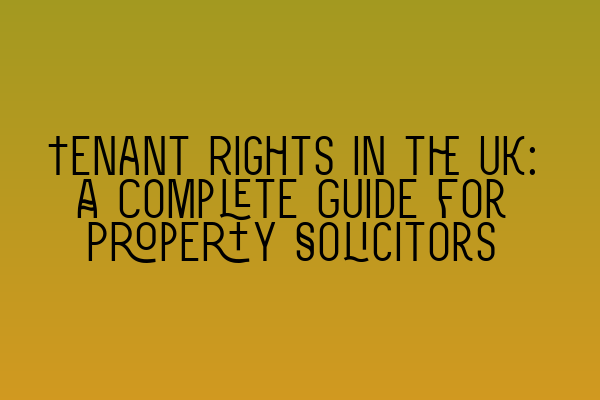Tenant Rights in the UK: A Complete Guide for Property Solicitors
As property solicitors, it is essential to have a thorough understanding of the laws and regulations surrounding tenant rights in the UK. With the growing rental market and increasing complexities in property transactions, it is crucial to provide reliable and expert advice to both landlords and tenants alike. This comprehensive guide aims to equip property solicitors with the knowledge and insights needed to effectively navigate tenant rights issues.
1. Understanding the Basics
Before delving into the intricacies of tenant rights, let’s start by understanding the fundamental concepts. A tenant is an individual or entity who rents or leases a property from a landlord. The tenancy agreement, which can be oral or written, governs the rights and responsibilities of both parties involved.
To protect the interests of tenants, various legislations have been enacted in the UK, including the Housing Act 1988, the Landlord and Tenant Acts, and the Equality Act 2010. These laws ensure fair treatment, security, and protection against discrimination for tenants.
2. Types of Tenancy
In the UK, different types of tenancies exist, and each comes with distinct rights and obligations. It is crucial to have a comprehensive understanding of these tenancy agreements to provide accurate advice. Some common types of tenancy include:
- Assured Shorthold Tenancy (AST): The most common type of tenancy in the UK, offering tenants a minimum term of six months with certain rights and protections.
- Assured Tenancies: These tenancies provide long-term security of tenure, usually granted before 1989 and involve regulated rent increases.
- Non-Assured and Common Law Tenancies: These tenancies are less common and often come with limited rights and protections for tenants.
It is important to understand the rights and obligations specific to each type of tenancy to provide accurate advice to clients.
3. Key Tenant Rights
Tenant rights in the UK encompass various aspects, ensuring fair treatment and protection against unlawful practices. Here are some key tenant rights that property solicitors should be well-versed in:
- Right to Quiet Enjoyment: Tenants have the right to peaceful enjoyment of their rented property without interference from the landlord.
- Right to a Safe and Habitable Property: Landlords have a legal duty to provide safe and well-maintained properties for their tenants.
- Right to Privacy: Tenants have the right to privacy and protection against unlawful intrusion from the landlord.
- Right to Protection against Unfair Eviction: Tenants are protected against unfair eviction and have the right to challenge evictions through proper legal channels.
- Right to Repairs and Maintenance: Landlords are responsible for maintaining a safe and habitable property, addressing repair issues promptly.
- Right to Protection against Discrimination: Tenants are protected against discrimination based on their race, gender, disability, religion, or sexual orientation.
By being well-versed in these key tenant rights, property solicitors can ensure that their clients’ rights are upheld and protected throughout their tenancy.
4. Evictions and Tenancy Terminations
Evictions and tenancy terminations can be complex and sensitive matters. Property solicitors play a vital role in guiding both landlords and tenants through this process while ensuring compliance with legal requirements.
It is crucial to understand the different eviction procedures based on the type of tenancy, such as serving notice, obtaining possession orders, or seeking court approval for eviction. Property solicitors should also be knowledgeable about the grounds for eviction, including non-payment of rent, breach of tenancy terms, or the landlord’s intention to sell the property.
Properly advising landlords or tenants on eviction processes can help avoid legal disputes and ensure fair treatment for all parties involved.
5. Security Deposits and Rent Arrears
Security deposits and rent arrears are two critical aspects of tenant rights and property management. Solicitors specializing in property law must have a firm grasp of the legal framework surrounding these matters.
Landlords are required to protect tenants’ security deposits by placing them in a government-approved Tenancy Deposit Protection (TDP) scheme. Property solicitors should be aware of the regulations governing deposit protection, including the prescribed information landlords must provide to tenants.
Furthermore, solicitors need to understand the procedures for recovering rent arrears and provide guidance on negotiation, repayment plans, or legal action, if necessary, to both landlords and tenants.
6. Dispute Resolution and Tenant Complaints
Tenant disputes and complaints are not uncommon in the rental market. Property solicitors often play a crucial role in resolving these issues through negotiation, mediation, or legal proceedings.
It is essential to have a solid understanding of the proper procedures for dispute resolution and the relevant court processes. Property solicitors must be familiar with the different avenues available, such as the Property Ombudsman Service, the Housing Ombudsman, or the First-tier Tribunal (Property Chamber).
By providing effective dispute resolution guidance, property solicitors can help their clients resolve disagreements swiftly and amicably.
Conclusion
Tenant rights in the UK are a complex and ever-evolving field, requiring property solicitors to stay up to date with the latest regulations and legal precedents. By understanding the basics, different types of tenancy, key tenant rights, eviction procedures, security deposits, rent arrears, and dispute resolution, property solicitors can confidently provide expert advice and navigate any challenges that arise.
At SQE Property Law & Land Law, our team of experienced property solicitors is equipped with in-depth knowledge and expertise in tenant rights. Contact us today to explore how we can assist you with your property law matters.
Related Articles:
SQE 1 Practice Exam Questions
SQE 1 Practice Mocks FLK1 FLK2
SQE 2 Preparation Courses
SQE 1 Preparation Courses
SRA SQE Exam Dates
